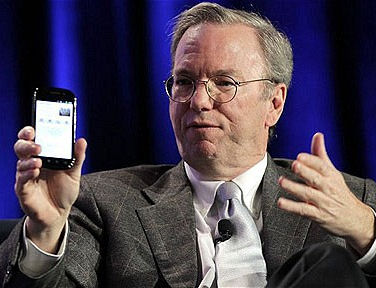MWC 2012: Mobile Will Change The World Says Google’s Schmidt

Google executive chairman Eric Schmidt challenged attendees to use mobile technology to create a global community of equals
Reciting a now-familiar theme, Google executive chairman Eric Schmidt in his annual keynote speech at Mobile World Congress laid out his vision of a world where technology empowers communities across the globe and acts as a leveller for the creativity and entrepreneurial spirit he said exists in every individual.
The address combined the former Google CEO’s sweeping view of technology’s benefits for humanity with futuristic societies employing applications to create new experiences, like using a holograph to virtually attend a rock concert or convention thousands of miles away.
Internet regulation warning
Schmidt (pictured) also touched on political themes and warned of the dangers imposed by the regulation of the Internet and proclaimed that an interconnected world leaves little room for autocratic and dictatorial governments to hide. He cited the outpouring of support and communication during the Arab Spring, the earthquake in Japan and the violence in Syria as examples. “In times of war and suffering, it will be impossible to ignore the voices that cry out for help,” he said.
 Despite the sometimes-grandiose bent of Schmidt’s speech (for example, his mention of a lunar eclipse via hologram from the deepest jungle of the Congo), he provided plenty of practical scenarios. These included small businesses using applications to grow a client base and reduce overhead, or the benefit of smartphones that act as mobile medical stations.
Despite the sometimes-grandiose bent of Schmidt’s speech (for example, his mention of a lunar eclipse via hologram from the deepest jungle of the Congo), he provided plenty of practical scenarios. These included small businesses using applications to grow a client base and reduce overhead, or the benefit of smartphones that act as mobile medical stations.
Then, he shifted back to driverless cars and an impending era of unlimited speed and processing power. “We’re beginning to see science fiction become a reality,” he noted.
Schmidt described the Web as a network of minds that is evolving into a global intelligence, portraying developers as engineers of human freedom, but he highlighted how far mobile access has yet to penetrate. He called the five billion people on the planet who do not yet have access to the Web the “aspiring majority”, but he admitted that the divide between classes would grow regardless of how fast technology was able to spread to poorer areas.
He also sent a warning to those who would attempt to regulate the Internet – that such efforts would fail and that attendees should work to avoid the rise of a “digital caste system” and use their talents to help people overcome barriers to freedom.
“The ultimate achievement is that technology actually disappears. It becomes part of everyday life. It will just be there. The Web will be everything, but it will be like electricity – always there. The future is indeed a very bright place,” he said. “We can create a global community of equals. This is a revolution that we started. I’m very, very proud to be among my pride. Let us resolve as developers and entrepreneurs to build a world where everyone has the chance to be connected. Let’s all get to work.”
What do you know about the latest in mobiles? Take our smartphone quiz and find out